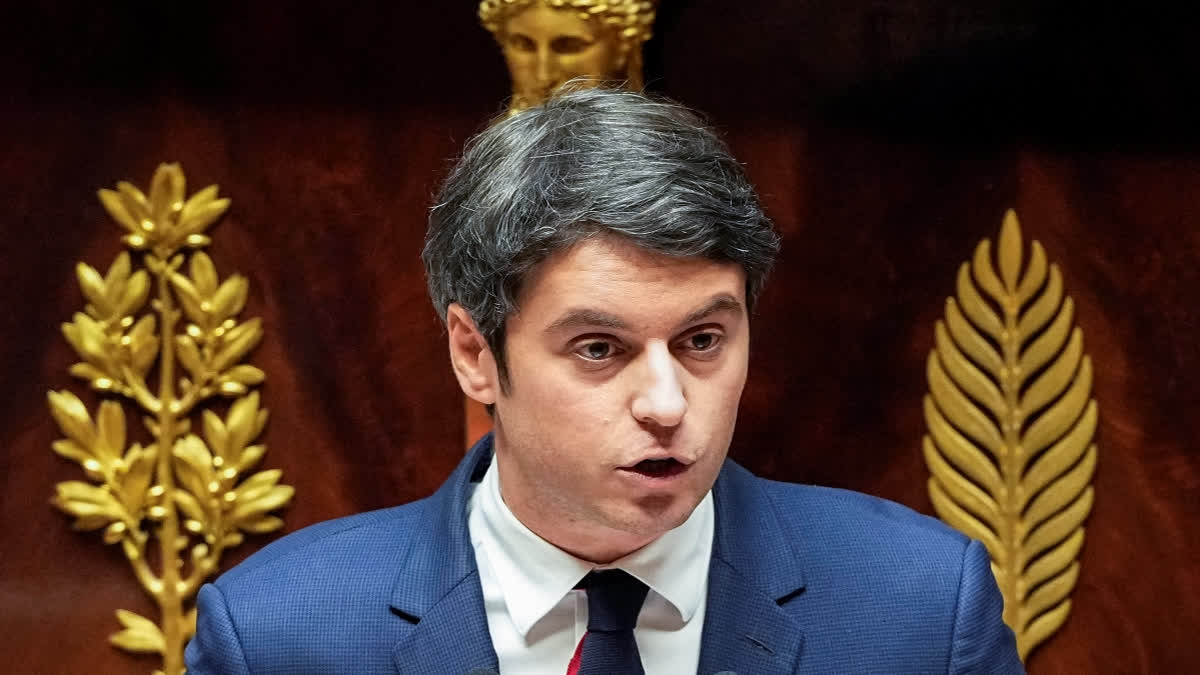Jossigny (France): France's newly appointed prime minister said Tuesday he is implementing controls on foreign food products in order to guarantee fair competition amid farmers' protests. In his general policy speech at the National Assembly, Gabriel Attal told lawmakers the goal is clear: guaranteeing fair competition, especially so that regulations that are being applied to (French) farmers are also respected by foreign products.
He also said food retailers who don't comply with a law meant to ensure a fair share of revenues for farmers will be fined, starting immediately. We need to listen to the farmers, who are working and are worried about their future and their livelihood, Attal said. Farmers have for days been protesting across France to put pressure on the government to respond to their demands for better remuneration for their produce, less red tape and protection against cheap imports.
Protesting farmers camped out Tuesday at barricades around Paris to press their case that growing and rearing food has become too difficult and not sufficiently lucrative. The farmers' campaign for better pay, fewer constraints and lower costs has blown up into a major crisis for Attal in the first month of his new job. Protesters rejected pro-agriculture measures that Attal announced last week as insufficient. The government promised more responses would be forthcoming Tuesday.
Protesting farmers encircled Paris with traffic-snarling barricades on Monday, using hundreds of lumbering tractors and mounds of hay bales to block highways leading to the French capital that will host the Summer Olympics in six months. Protesters came prepared for an extended battle, with tents and reserves of food and water.
The government announced a deployment of 15,000 police officers, mostly in the Paris region, to stop any effort by the protesters to enter the capital. Officers and armored vehicles also were stationed at Paris' hub for fresh food supplies, the Rungis market. Farmers who slept on a highway near the Disneyland theme park east of Paris were skeptical that the government would do enough to assuage their concerns. They grilled sausages, set up a television to watch the prime minister's speech and hung an effigy of a dying farmer from a bridge.
Stephane Chopin, an organic Charolais beef farmer from near Chateau-Thierry, northeast of Paris, described the cost and bureaucratic burden of trying to maintain organic methods while competing with food from other countries with lower labor and living costs. We have been trying make an effort for local produce, for the environment, for 20 years. We are trying, we are trying ... now we say stop, he said.
In neighbouring Belgium, a delegation from the Belgian Young Farmers association is blocking the main highway between Paris and Brussels just outside the Belgian capital for a third day in a row. Like their fellow farmers from across the European Union, they demand less bureaucracy and more money for their produce.
The movement in France is another manifestation of a global food crisis worsened by Russia's nearly two-year full-scale war in Ukraine, a major food producer. French farmers assert that higher prices for fertiliser, energy and other inputs for growing crops and feeding livestock have eaten into their incomes.
Protesters also argue that France's massively subsidised farming sector is over-regulated and hurt by food imports from countries where agricultural producers face lower costs and fewer constraints. French President Emmanuel Macron will meet on Thursday in Brussels with the European Commission chief to discuss the farming crisis.
But Macron defended the EU farm policy overall as the only way to keep European agriculture alive in a globalised economy. "Without a common agricultural policy (in the EU), our farmers wouldn't have revenue. Many of them would not be able to survive," Macron said Tuesday during a trip to Sweden.
- " class="align-text-top noRightClick twitterSection" data="">



